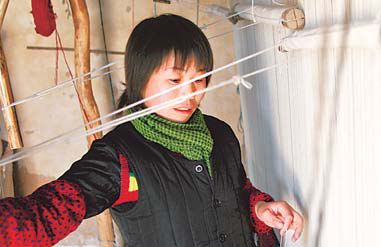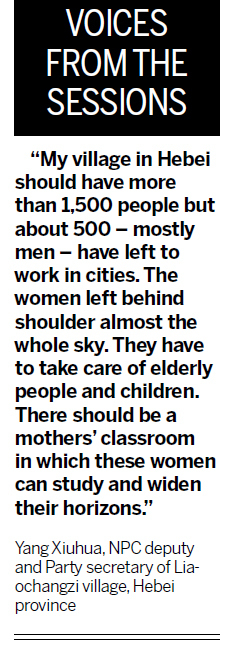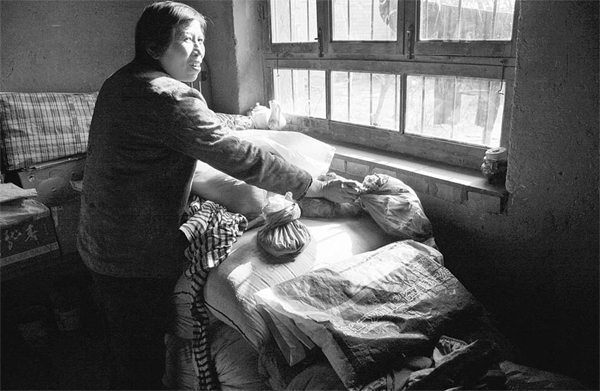Society
'Work widows' suffer in silence
By Hu Yongqi in Pingliang, Gansu, and Peng Yining in Beijing (China Daily)
Updated: 2010-03-08 07:38
 |
Large Medium Small |
|
 |
|
Gao Zhuan, 37, weaves carpets to earn extra money in Pingliang, Gansu province. Her husband has worked away for the last 13 years. FENG YONGBIN/CHINA DAILY |
Wives of migrant workers are 'lonely and depressed' warn experts ahead of Women's Day. Hu Yongqi in Pingliang, Gansu, and Peng Yining in Beijing report.
Chairman Mao famously said in the 1960s that women hold up half the sky. Five decades on, many of them are instead struggling to hold down the fort in towns and villages across China.
As men leave the countryside in search of better opportunities in large cities, analysts say the wives they often leave behind are among the most vulnerable members of society.
The number of "work widows" - so called because they lose their migrant worker husbands for long periods of the year - has already hit about 20 million, according to experts. They warn that the majority of these women experience severe depression and loneliness, as well as struggle because of their poor education levels.
As the world celebrates the 100th anniversary of International Women's Day on Monday, governments at all levels are being urged to offer more help to ease the burden.
For almost 13 years, Gao Zhuan, 37, has been raising her two children by herself in Damaigou village, near Pingliang, Gansu province. Her husband, Yue Shuangbao, has spent most of that time digging coal more than 1,000 km away at a mine in Inner Mongolia.
To earn money from the family's land, Gao must not only do her work but her husband's, too. She sows wheat every spring, and because Gansu has a chronic water shortage - it got only 450 mm of rain in 2008, 70 percent of the national average - she regularly has to carry two large buckets of water to irrigate them. Then, every autumn, she hauls a cart laden with 100 kg of grain back to her home.
Standing only 1.5 m tall, she is deceptively strong, but 13 years of hard labor have taken their toll. Her hands have large calluses after years of weaving carpets to make extra money.
"My husband has to work away to make enough money to send our children to school. He cannot do that here," said Gao, a shy woman who explained she is wary of talking to people in case it causes a dispute and her husband is not around to protect her.
Yue, who earns about 1,500 yuan ($220) a month as a miner, returns home just once or twice a year. He is only allowed time off at Spring Festival or if the mine is not busy.
Although Yue Xu, their son, is only 15 and still receives free, compulsory education, the couple pay out more than 2,000 yuan a semester in tuition fees for their daughter Yue Juan, 18.

More than 100 residents leave Damaigou to find work in South China's Guangdong province every year. The village comprises 19 families and each includes at least one woman who is married to a migrant worker, said locals.
Yue said his biggest fear is for the security of his wife and children. He recalled that, in 2006, while he was in Baotou, a thief broke into their home. Although he did not steal anything - their only electrical device is a 10-year-old television set - he said it scared his family. "My wife and Yue Xu found footprints left by the thief on a white wall. They were terrified," he said.
Almost every family in Damaigou now has a dog that barks when strangers approach, he said.
More than 20 percent of all married women in Northwest China - about 100,000 - are "work widows", according to a survey by Pingliang Women's Federation late last year.
"Women in rural areas generally already have a low standard of living but for these left-behind women it is even worse," said Jiang Yongping, a senior researcher for the women's studies institute of the All-China Women's Federation. "The labor is the biggest burden, but they also suffer loneliness and depression due to economic pressures.
"They have to take care of their children, elders and farms. And they must do it alone. After marriage they don't get a better life, they get the opposite."
The situation is one of the greatest social problems facing the countryside, warned Ye Jingzhong, a professor in social development at China Agricultural University in Beijing, who in 2008 completed a two-year survey of left-behind women in Anhui, Henan, Hunan, Jiangxi and Sichuan provinces.
"The ultimate goal for left-behind women is to educate their children. About 75 percent stay at home to help their children - most aged from 7 to 16 - with their schooling," he said.
However, most "work widows" themselves are poorly educated, while some are even illiterate, say experts.
Gao in Damaigou never attended school because her father could not afford it, she said. She can read and write only a handful of Chinese characters and can do only very simple calculations. "My children have to do their homework all by themselves. I can't teach them at all," she said.
Yue Xu, her son, said: "I really need guidance but I can't ask my mother. I know my scores are not good enough. All I can do is try to work harder." The teenager added that he plans to get a job like his father's if he fails to get into college.
|
 |
|
Zhang Chunfang, 50, has no husband to help her pile bags of grain in Damaigou, Gansu. FENG YONGBIN/CHINA DAILY |







